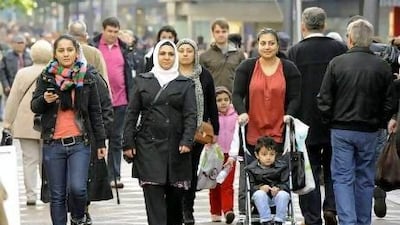BERLIN // Aylin Selcuk was born in Germany to Turkish parents, speaks perfect, accent-free German and is studying dentistry in Berlin.
Yet the 23-year-old has started thinking about moving to Turkey or another country, like many of Germany's three-million-strong Turkish community who feel increasingly alienated, according to a recent study.
"An educated core of people are saying I don't want to live in Berlin or Germany anymore, I want to go out back to Turkey or other countries," Ms Selcuk said. "These people did everything the state demanded of them ... integrate, speak German, get educated.
"But even this core doesn't feel at home here, they're saying they don't want to go on being treated like a second-class citizens, that they have more opportunities outside Germany."
The representative survey of 1,011 people with Turkish roots found that just 15 per cent feel Germany is more their home than Turkey, six points down from a similar survey conducted three years ago.
A total of 45 per cent of respondents said they planned to move to Turkey, up from 42 per cent three years ago, said Info GmbH, the Berlin-based research firm that conducted the survey.
That is a surprisingly high percentage given that 56 per cent of the Turkish population has lived in Germany for more than 20 years.
The findings of the survey don't surprise Ms Selcuk, who founded an interest group representing young German Turks in 2007, when she was still at school.
"We kept getting told you must fit in and we're saying, 'hang on a minute, we were born here! We're part of this society.' This isn't about integrating, this is about participation."
The Info survey makes for disturbing reading given that Turkish immigration in Germany dates back half a century. Turks started coming to West Germany as "guest workers" between the 1950s and 1970s to make up for a shortage of manpower after the Second World War.
Yet many of them, even those born in Germany, have worse-than-average education standards and job prospects.
A government report released in 2010 showed that the jobless rate among people with an immigrant background was twice as high - 12.4 per cent - as among Germans with local roots.
OECD studies have criticised Germany's education system for failing to cater adequately for the needs of immigrant children.
"We're not one society," said Ms Selcuk.
"It's important to be recognised, and Germany simply isn't recognising part of its youth.
"And then there's surprise when people say they no longer want to live here. It's really sad."
In a sign of how torn many Turks are between their roots and Germany, 78 per cent of respondents in the survey said they wanted to integrate into German society - while 62 per cent said they preferred just being around other Turks, up from 40 per cent two years ago.
While Turks said Germany had a higher standing of living as well as better welfare, education and legal systems, they viewed Turkey as a more attractive, tolerant and friendly place to live.
"The results tally with our experiences and what we've been hearing," said Kenan Kolat, the chairman of the Turkish Community in Germany.
"Particularly the young, qualified German-Turks want to go back because they see better chances for career advancement in Turkey."
Oliver Mohr, a spokesman for the German minister for migration, refugees and integration, said the media had exaggerated the findings of the survey but declined to comment further.
"We will stick to our integration policy of doing everything so that immigrants from Turkey or elsewhere who want to integrate feel at home here," he said.
Info GmbH said the findings may have been influenced by anger over the discovery last year that a neo-Nazi terrorism group was behind the assassination-style killings of nine, mainly Turkish, immigrants in a murder spree that had baffled police for a decade.
The "National Socialist Underground", a trio of terrorists uncovered by chance last November, said it had murdered the men in cities across Germany between 2000 and 2006.
Police had long refused to contemplate a far-right motive for the killings, and had instead questioned the families about whether the victims had gambling debts or links with criminal gangs.
The case has exposed the German law enforcement authorities to charges of institutionalised racism and of being blind to the threat of far-right violence against minorities.
"The Turks believe the security services aren't capable of protecting immigrants," said Mr Kolat. "Faith in the security services has hit rock bottom."
The Info survey showed that 29 per cent of respondents had experienced verbal abuse because of their Turkish appearance - although that was down from 42 per cent in a 2010 survey. A total of 16 per cent said they had been assaulted because of their origin, and a quarter said they believed they had been discriminated against in job applications.
The community is getting more religious, with 37 per cent describing themselves as "strictly religious," and 72 per cent saying Islam is the only true religion, up from 69 per cent in 2010.
The highest share of Turks describing themselves as religious was among people aged 15 to 29.
"The results point to an increasing role of the Islamic faith in the value system of Turks in Germany," said the director of the Info institute, Holger Liljeberg. "Finding identity through Germany hasn't worked, now they're finding their identity via Islam."

